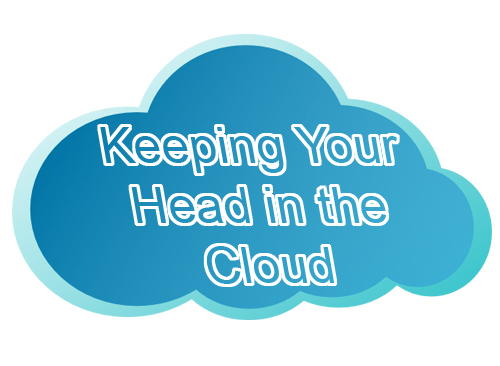
What do you picture when you hear the phrase, “The Cloud?” Do you imagine clouds in the sky such as Cumulus, Cirrus, and Stratus? If we were a weather related blog you’d be correct in thinking this. At this point we’d probably be just as successful predicting the weather as those who are actually “trained” in that field, but for now, we’ll stick with computers and technology. For our purposes, “The Cloud” refers to data networks and the various things that these networks offer. Today, we’ll take a look at exactly what people are talking about when it comes to this Cloud, and how we can use it to our advantage.
To understand what “The Cloud” actually is, let’s compare it to something that we use on a daily basis, yet most don’t understand how it actually gets to us: electricity. Most of us are connected to the electrical grid. I know that some are able to live off the land and unplug, but unless you have total solar or wind power, you benefit by being connected to the grid. While our homes are wired connecting us electrically, we don’t actually have to head to a power plant or hook up to a high tension line ourselves, yet we can still access shared electricity. In essence, that’s what “The Cloud” is. It’s a series of networks – wires, servers, etc. that we can access via the Internet. Our computers can access “The Cloud” through dial up, DSL, cable, or Wi-Fi connections, while portable devices such as tablets and phones can connect in the afforementioned ways or through mobile networks. To put it simply: any program or service that is housed on the Internet and not on your computer at home.
One of the most common ways you’ll encounter “The Cloud” is in the world of storage. If you own an Apple product, you’re surely familiar with iCloud. iCloud is Apple’s own version of “The Cloud” to service the needs of their own devices. With iCloud, each user gets a certain 5 GB of storage space which allows their documents, photos, videos, and the like to be backed up automatically and stored on the Apple network. This is helpful in three ways: one, you don’t have to worry about backing up your files yourself, two, you don’t have to save the physical files on your devices so hard drive space is less of a concern, and three, you can access these files from anywhere with any computer or device. Carbonite and IDrive are two popular (and common) “Cloud-based” backup options. You simply pay a subscription fee, and all your files are backed up on the company’s network. If your computer crashes and you need a new one, no problem. Download your personal files back from “The Cloud” and you’re back in business. Google Drive is another example of a way to share files with others without having to physically move them from one computer or device to another.
Like anything else, there are drawbacks to using “The Cloud”. Some people aren’t comfortable with having their personal files on the Internet. Websites and networks get hacked every day. The odds of your files getting into the wrong hands aren’t good, but it is a possibility. It’s also likely that several different servers are used to store your files in places such as iCloud, Carbonite, IDrive, or Google Drive. These are backups on top of backups. If one server crashes, they need to be sure that there’s another in place so you don’t lose your files. You lose a little control of your files in a situation like this. If you delete a file from your computer, you’re trusting that it’s deleted from each of the servers that that file is on in “The Cloud”. If you’re one of those people that like to channel your inner Mick Jagger and say “Get Off of My Cloud,” that’s your choice. It’s not for everyone. “The Cloud” is here to stay, however, as more and more data in the form of personal files and even software is located far away from us in cyberspace. Whether you agree with that or not, it’s important to “Keep Your Head in the Cloud” today and every day!
